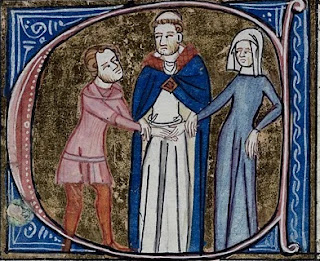William was born about 893 to Rollo and Poppa of Bayeux. His parents (and he) were pagans, and were married more danico ("according to Danish custom"). Part of the treaty with Charles meant converting to Christianity in 911. "William" is not a typical Danish/Viking name, and he was probably re-named at his conversion/baptism, so his birth name is lost to us.
Rollo handed over the reigns to William in 927. Rollo's exact age is unknown, but he was probably at least in his 50s; he lived another five years. Orderic Vitalis writes that, in 933, Normans who felt the William was becoming too "Frankish" rebelled against him, besieging him in Rouen. William defeated the rebellion, establishing himself more firmly as a strong leader.
In that same year, Charles' second successor in West Francia, Raoul, was fighting to maintain control over his land and fight off Viking attacks. William came to his aid, in return being granted more land in the north of France, including Breton territory, the Cotentin Peninsula (that juts towards Britain) and the Channel Islands. resistance from the Bretons was quickly defeated.
William expanded his territory further when he married Luitgarde of Vermandois, daughter of Count Herbert II of Vermandois. He also married his sister Adela (born Gerloc before converting to Christianity) to William, Count of Poitou. William now had powerful allies in Vermandois, Poitou, and of course West Francia. When Raoul of West Francia died in 936, his son Louis IV had an extremely difficult time establishing himself, both against the Bretons who were still upset about losing land, and from his own barons. William supported him, getting excommunicated for his troubles because of battles with the Count Arnulf of Flanders. William pledged loyalty to Louis, however, and was confirmed in all the lands Rollo and William had been given.
William's destruction of some of Arnulf's estates needed resolution, however, and a date was chosen for a peace summit. While the two and their people met on an island on the Somme, on 17 December 942 William was ambushed and killed by some of Arnulf's followers.
William had no children by Luitgard. He had, however, like his father, a more danico wife, Sprota, with whom he had a son, Richard. At the time of William's death, Richard was 10, but he became Count of Rouen and the ruler of the Normans. Tomorrow we will continue examining the dynasty that led to the true Duchy of Normandy and William the Conqueror.


